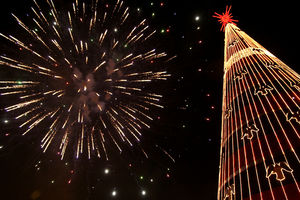Christmas Celebrations in Spain are slightly different from those in the USA and United Kingdom. Although celebrating with a Christmas tree and giving present on the 25th is growing in popularity it’s not tradition. If Christmas is your favourite time of year and wished it went on a little longer, then Spain is the place to head after the festivities end at home. The excitement and decorations are all still up until the 6th January (and the weather in the South isn’t bad either) so get the flights, accommodation and car hire booked and enjoy a family holiday in Southern Spain over New Year and early January.
Here’s a breakdown of festivities…
Navidad – 25th December
The Spanish are still very family focused and Christmas day is traditionally saved for going to Church and a large family meal. Turkey isn’t the norm for the Christmas either, usually a whole fish and seafood is the typical food. Specialities in Southern Spain include covering a large whole fish in sea salt and slow cooking, then brushing the salt off and underneath is a succulent tender fresh fish. For dessert and if people visit your home during the Christmas period it’s polite to offer local wine (often sweet), nougat (called Turron) and almond based sweets with varying flavours like, anise and chocolate.
Noche Vieja – 31st December
New Year’s Eve is much the same as most other places in the world. The New Year is brought in with fun and festivities. The main difference is a meal is eaten again traditionally with family where it comes to an end just before midnight and then each person is given 12 grapes. Each grape is eaten each time the clock chimes at twelve o’clock, all the grapes must be finished by the twelfth chime for good luck in the New Year. Another tradition is that men and women wear red underwear on New Year’s Eve for luck in love in the New Year.
The Epiphany – 5th January
Presents get given on the night of 5th January, this stems from when the Three Kings visited Jesus with the gifts of Gold, Frankincense and Myrrh. In towns and cities across the country the scene of the Three Kings is re-enacted and children get incredibly excited at the promise of the Three Kings visiting them that night.
If you get the chance to visit Southern Spain around the New Year and early January there are Christmas markets held in most cities, like Málaga and Seville, which are open late into the night with pretty lights and the smell of roast chestnuts wafting around the stalls.
Ivy Mennell is a travel writer who also works for a small car hire company based in Málaga called Espacar.





I´ve never heard of the January 5th celebration, the Epiphany, or maybe just on the next day, on the 6th celebrated on some places in Latin America, when children get presents left by the Three Kings, obviously the influence of the Spanish Colonies. Still it sounds an amazing place to spend the last days of the year on a very spiritual way and definitely with loved ones.